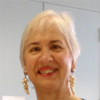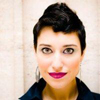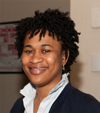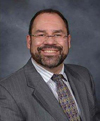| |
 Alena Gerst '09 Alena Gerst '09
Licensed Clinical Social Worker and Yoga Instructor
New York City Hospitals
What do you do in your current role?
I bring my social work skills to the medical profession, particularly working in mind/body health and wellness. I work in an outpatient mind/body health and wellness center for women with disabilities as a part of NYU Medical Center, providing individual and group counseling and leading meditation and breath workshops for anxiety and depression. As a certified Yoga teacher, I also integrate my clinical and mind/body backgrounds on inpatient units at New York City hospitals, and in private practice.
Tell us about your career path.
After obtaining my degree in psychology, I came to NYC from Arizona in 1998 as a professional dancer and singer. As a dancer I was naturally drawn to Yoga to maintain health and fitness. Over time, I became increasingly drawn to service beyond entertaining an audience, so after 10 years in the business, I decided to get my masters in social work while also studying to become a Yoga teacher.
What do you enjoy about your job?
I love being in a position to help people obtain the tools to lead more independent lives. I also relish helping people learn about the powers within themselves they can use to feel better. And I am thrilled to be positioned in a clinic whose mission is to spread knowledge on the benefits of not just curing a disease, but healing and being well.
What impact did CSSW have on your career?
CSSW's clinical focus on health, mental health and disabilities was perfect for me. The coursework and electives taught me the clinical tools I needed to get started on my career, while also allowing space for me to explore my interests in mind/body health and wellness. I was able to integrate my interests into my research with full support of my professors.
What do you remember most about your time at CSSW?
The accessibility and commitment of my professors to see me succeed.
Do you have any advice for CSSW students or alumni who are interested in your field?
Informational interviews are extremely helpful. If you read an article or go to a lecture that is of interest to you, contact the expert and ask if they can answer some questions about their trajectory and training. Nine times out of ten, they will be happy to talk to you.
What are you reading and/or following now (e.g. book, blog, social media groups, etc.)?
I subscribe to several wellness and health related emails, blogs, and periodicals. My favorites are MindBodyGreen, Dr. Frank Lipman's Weekly Roundup, and Yoga Therapy Today. I am awaiting publication of my first book, which is a wellness handbook for performing artists, and have begun collaborating on my second book about wellness with a friend and colleague who is a physician and acupuncturist.
|
 Barry Panzer '89PhD
Barry Panzer '89PhD
Psychotherapist
Mental Health Consultant
Pediatric Obesity Clinic
What do you do in your current role?
I have maintained a full time psychotherapy practice with children, adults, and families for more than thirty-five years. In 2011 I also assumed the role of Mental Health Consultant to the Pediatric Obesity Clinic at Brookdale University Hospital and Medical Center. This position involves clinic, teaching, and research activities.
Tell us about your career path.
My first clinical position was in the Department of Child Psychiatry at Kings County Hospital, followed by several consultant positions at special education schools and group homes for the developmentally disabled. During this period I also received postgraduate certificates in family therapy and cognitive behavior therapy. For nearly 10 years I was the senior clinician at the NYC Sudden Infant Death Syndrome program, which ultimately become the topic for my doctoral dissertation.
What do you enjoy about your job?
Helping individuals and families achieve a better life has given my life meaning for nearly four decades. It is especially challenging to be at the forefront of responding to the childhood obesity epidemic.
What impact did CSSW have on your career?
I entered the program with advanced clinical skills, and graduated with a great appreciation for scientific analysis and applications in intervention research. More than any skill acquisition, CSSW provided exposure to greatness, legendary professors such as Carol Meyer, Alfred Kahn, David Fanshel, and Howard Polsky.
What do you remember most about your time at CSSW?
The enthusiasm, diversity, and intellectual capacity of my classmates, many destined to become leaders in our profession. Unforgettable? My pager beeping during a class with Professor Meyer and her interrupting the lecture for me to do a case presentation based on the patient contacting me.
Do you have any advice for CSSW students or alumni who are interested in your field?
There is no substitute for achieving excellence and maintaining your expertise. Read the biography of Dr. Alfred Schweitzer. Choose generativity over stagnation.
What are you reading and/or following now (e.g. book, blog, social media groups)?
Books about Acceptance and Commitment Therapy (ACT), and The Dream Team by Jack McCallum.
| |
 Annette Poizner '93 Annette Poizner '93
Psychotherapy Private Practice
Toronto, Canada
What do you do in your current role?
I am a psychotherapist in private practice. I tend to work with clients when conventional psychotherapy hasn't helped. Clients find me because I do something called projective personality assessment, a practice that has the trained clinician collecting material from them– simple drawings, made up stories, earliest memories, and even samples of handwriting, all of which can be analyzed to derive personal information about them. So I "look under the hood," so to speak, and get information about clients which allows me to target issues in the therapy that follows.
Tell us about your career path.
Twenty-five years ago, I received profound feedback from a therapist who analyzed handwriting and projective drawings. I went on to study graphology. When I did a psychology doctorate at the University of Toronto (after Columbia) my doctoral dissertation explored the use of graphology within psychotherapy. More recently, an academic publishing house has just published my academic text entitled, "Clinical Graphology: An Interpretive Manual for Mental Health Practitioners."
What do you enjoy about your job?
I love discovering the mysterious intricacies of the psyche and consider it an honor and a privilege to work with people in this capacity. I am endlessly fascinated by this work. And I love working with really interesting people from a range of professions and callings.
What impact did CSSW have on your career?
Columbia is a school which allows students to pursue their own interests. One professor found the psychology of handwriting to be an interesting topic and gave me the opportunity to do an independent study. That work ultimately found its way into my literature review and my doctoral dissertation.
What do you remember most about your time at CSSW?
I remember the absolute excitement of living in Manhattan. The dynamism of the city. I came from Toronto, Canada and returned home after I finished the degree. I miss New York and look for any excuse to visit!
Do you have any advice for CSSW students or alumni who are interested in your field?
Some students in the clinical track might have an agenda, down the line, to practice psychotherapy. For those students, I would suggest they explore the world of projective psychology, reading and learning, because these skills are extremely marketable. Clients are intrigued to learn about their personality style, gifts and challenges etc.; it draws them in, makes you competitive and establishes your credibility as a person who has insight into them and can be helpful.
What are you reading and/or following now (e.g. book, blog social media groups, etc.)?
I have a long-standing interest in the psychology and traditional medicines from other cultures. I've recently come upon the revised edition of a fascinating classic, "Dragon Rises, Red Bird Flies: Psychology and Chinese Medicine." So this is the Chinese medical version of the DSM! I find it fascinating!
 Mary G. Ross '75 Mary G. Ross '75
Former Hospital Social Work Director
What do you do in your current role?
I am presently a volunteer for my development's Neighborhood Watch as the Coordinator, serve as President of my church's United Methodist Women, Long Beach UMW Social Action pro tem Mission Coordinator, Shawl Ministry knitter and PTA volunteer.
Tell us about your career path.
I retired from being a Hospital Social Work Director serving in New York State and California. I was Vice President and President of the Empire State Chapter of Hospital Social Work Directors and Secretary/Treasurer and Vice President of the Western New York Society (American Hospital Association) Social Work Directors. I started the Social Work Department in my local village hospital right after I graduated from Columbia!
What did you enjoy about your job?
It was challenging and there was always something new to learn as I assisted staff in delivering social work services. I always had my own caseload, which was quite fulfilling. Meeting and assisting persons to reach their full potential was the best.
What impact did CSSW have on your career?
Had it not been for obtaining my Masters Degree in social work, I could not have accomplished all that I have. This includes my volunteer time in various organizations after retiring to be a stay at home mom for three children. I participated in all of my children's school's PTAs, holding all of the offices, except Treasurer, as well as serving on the CA State Thirty-Third District PTA as Chair of Education, and my United Methodist Women's work.
What do you remember most about your time at CSSW?
I recall the small classes, running from one end of campus over to 113th Street and spending hours at the library. My field placements were particularly meaningful.
Do you have any advice for CSSW students or alumni who are interested in your field?
Explore, read, and volunteer in the field. There are so many interesting positions!
What are you reading and/or following now (e.g. book, blog social media groups, etc.)?
I belong to a book club, all former PTA/PTSA friends, and we read various genre each month. Last month we read Julia Barnes' The Sense of an Ending. This month it is Dan Sharpiro's Mom's Marijuana and next month we read Beryl Markham's West With The Night.
 Jenna Benn Shersher '07 Jenna Benn Shersher '07
Associate Regional Director
Anti-Defamation League
Chicago/Upper Midwest Region
What do you do in your current role?
I am currently the Associate Regional Director of the Anti-Defamation League in the Chicago/Upper Midwest Region and the Founder of Twist Out Cancer. At the Anti-Defamation League I oversee international affairs advocacy, young leadership development, social media, marketing and PR for the agency at a national level. At Twist Out Cancer I am the founder and visionary for the foundation which provides psychosocial support for cancer survivors and their loved ones.
Tell us about your career path.
I have been at the ADL for the last six years and in that time my role and responsibilities have grown ten-fold. As a recent young adult cancer survivor I was able to leverage social media to create a necessary community of support. This network has enabled me to spearhead the social media efforts of ADL and likewise enabled me to create my own foundation in 2011.
What do you enjoy about your job?
At ADL my day to day work is completely dependent on the news cycle. I never find myself doing the same thing each day. I love the energy and pace and I have been fortunate to have a boss that has been completely open to developing my skills and affording me opportunities to grow. At Twist I feel that I am able to significantly impact cancer survivors and offer them new outlets for creativity and support.
What impact did CUSSW have on your career?
I am incredibly indebted to CUSSW for providing me with the clinical and managerial skill set. I use these skills in my day to day activities at the ADL and at Twist Out Cancer. I am [also] thankful that I learned about human resources, program development and implementation and financial management. I still use my coursebooks!
What do you remember most about your time at CUSSW?
I absolutely loved my coursework! In particular I loved the courses taught by Judith Marks and Shelly Akabas. I think of them often and believe I am a more thoughtful professional because of them.
Do you have any advice for CUSSW students or alumni who are interested in your field?
I think its important to find a job where there is room to grow.
What are you reading and/or following now (e.g. book, blog, social media groups, etc.)?
Cutting for Stone by Abraham Verghese
 Nathan Smith '02 Nathan Smith '02
Social Worker
Harlem Village Academy High School
What do you do in your current role?
I am currently a School Social Worker at Harlem Village Academy High School. Primarily I am responsible for providing individual and group counseling to students and supporting teachers within the classroom to improve relationships and interactions with students. Additionally, I help to establish working relationships between the school and the Harlem community.
Tell us about your career path.
Before I began doctoral studies at Fordham University's Graduate School of Social Service, I served in a dual position at Harlem Village Academy High School as Dean/Social Worker for three years. Previously I served at the Knowledge is Power Program in New York City as the Founding Social Worker and Founding Counseling Director. I was responsible for providing direction to the counseling program and creating workshops geared towards college persistence for high school and college-age alumni.
What do you enjoy about your job?
I enjoy most working with young people engaged in life's complexities and helping them navigate those obstacles. Satisfaction comes from knowing the young people I work with tussle with finding themselves and ultimately reaching a level of success they can be proud of.
What impact did CSSW have on your career?
The skills and knowledge I acquired at CSSW has helped me in my career as an administrator and practitioner. Equally important were the connections I have kept with CSSW classmates and made with alumni. In almost every position I held after CSSW I managed to work with fellow graduates within the same organization
What do you remember most about your time at CSSW?
I remember most my participation with the CSSW Black Caucus. It was extremely important that I find a support system to push me to my destination. I also remember how much fun I had in class. The professors kept me engaged, motivated and excited about becoming a Social Worker.
Do you have any advice for CSSW students or alumni who are interested in your field?
It really doesn't matter if your experience was different or similar to that of high schoolers but what matters is can you bring yourself to understand their experience. High schoolers are not concerned about your credentials. They're concerned about your willingness to care and help them.
What are you reading and/or following now (e.g. book, blog social media groups, etc.)?
How Children Succeed: Grit, Curiosity, and the Hidden Power of Character by Paul Tough and How It's Being Done by Karin Chenoweth.
 Tonia Spence '02 Tonia Spence '02
Director, Outpatient Clinic
Jewish Board of Family and Children's Services
What do you do in your current role?
I am currently the Director of an outpatient clinic in Harlem for JBFCS. I supervise staff, 2nd year MSW students, and ensure that clinicians are receiving the support they need to work with children and their families. I also ensure the clinic is fiscally sound.
Tell us about your career path.
I started as a 6th grade teacher after undergraduate school. I worked on various school committees, met with parents and children but realized I wasn't making the type of impact I was hoping to make with the families of my students. I received my Masters in Special Education (after teaching for 3 years) and decided I should continue on to get get my Masters in Social Work. I then worked as a Special Educator Itinerant Teacher (SEIT) with preschool children and their families. Working with children individually and supporting the families to implement strategies, was rewarding. The impact was clear and the families involvement was consistent because of the nature of the work. As an SEIT, I was able to also work part time at an outpatient clinic where I recognized I needed to build my clinical understanding. Once I accepted how much it takes to really build a clinical understanding that can have an impact, I left NY to participate in a Fellowship Program at Yale University's Child Study Center. Now I am back in NYC at JBFCS.
What do you enjoy about your job?
Working with the next generation of social workers, as they will affect change with their new ideas, energy, and understanding of the global landscape.
What impact did CSSW have on your career?
CSSW was the place where I began to understand that we bring so much of who we are into our work; and with that comes the responsibility of understanding how who you are affects your practice/work in the communities being served. I learned skills such as learning to respect everyone's opinion, that engagement is the foundation of social work, to start where the client is as it allows for the clinician to get to know who they are working with and gives the client a chance to tell their story, and Maslow's hierarchy of needs. The more I work with families, the more this concept has lead me to do clinical case management first before even trying to do psychotherapy. What I've learned is that it is hard for a mother to bring her child in for misbehaving in school when her children are hungry, without shelter, and/or they feel unsafe. When I begin here I am not only engaging the family, I am starting where the client is.
What do you remember most about your time at CSSW?
Being a women of color who often was looked to to answer questions about people of color and feeling unable to state that each person is different, and although we may share some commonalities the most important work we can do is to get to the know the client and family sitting in our office.
Do you have any advice for CSSW students or alumni who are interested in your field?
Become a life long learner. Take a class every year in something to ensure you are always growing and developing your skills.
What are you reading and/or following now (e.g. book, blog social media groups, etc.)?
Reflective Supervision and Leadership by Mary Claire Heffron and Trudi Murch, The Whole Brain Child by Daniel Siegel and Toxic Charity by Robert Lupton
 Michael Tozzoli '96 Michael Tozzoli '96
Chief Executive Officer
West Bergen Mental Healthcare
What do you do in your current role?
I am the CEO of West Bergen Mental Healthcare. West Bergen is a large multifaceted community mental health organization that has a strong emphasis on children, families and outcome based programs.
Tell us about your career path.
My career path has been varied, particularly as it relates to the size of agencies and leadership training. I was the Director of an Outpatient Counseling Department in a very large psychiatric hospital for a few years and this helped me understand the role of middle management, and particularly the challenge of interpreting an organization's mission to the line staff. I joined the team at West Bergen Mental Healthcare as the Administrative Director overseeing new program development and general administration. As part of a carefully articulated succession plan (something atypical in the nonprofit sector!), I was appointed CEO in 2005. My predecessor remained on staff as a major gifts officer.
What do you enjoy about your job?
I enjoy my role’s requirement to intersect West Bergen programs with that of the overall field. I particularly enjoy launching new and innovative programs that, in several cases, lead the field.
What impact did CSSW have on your career?
CSSW had a huge impact on me. It was during that time that I realized that my practice did not necessarily have to be micro in focus (i.e. purely clinical) and that my impact could be broader and more macro.
What do you remember most about your time at CSSW?
The diversity and strength of the students immediately comes to my mind when I think about my time at CSSW. I still maintain several strong connections with people I met at CSSW and work with them on many different levels.
Do you have any advice for CSSW students or alumni who are interested in your field?
Continue to think big and diversify your skill base. The field is much broader than the majority of social work thinks, and your ability to impact people/communities/issues is greater than you can imagine!
What are you reading and/or following now (e.g. book, blog social media groups, etc.)?
I just finished Far From the Tree by Andrew Solomon. It reminded me that all relationships are complex and that the greater society plays an important role in all dynamics. I am a daily reader of the Harvard Business Review and the Stanford Social Innovation Review. Leading a nonprofit requires many different skills that I continue to broaden and work on.
|